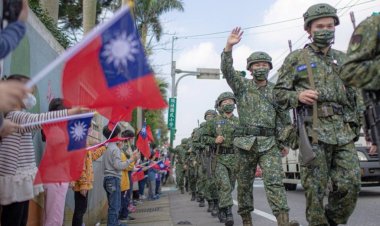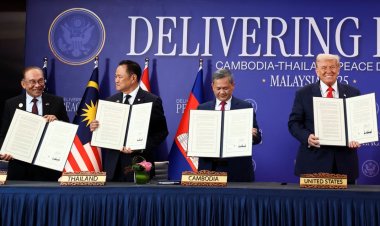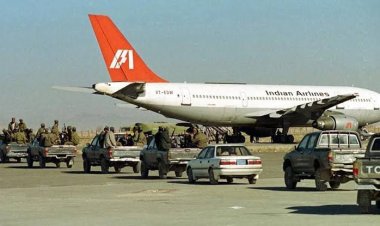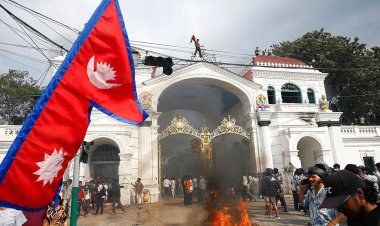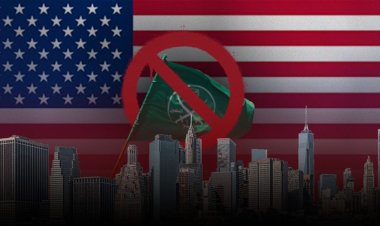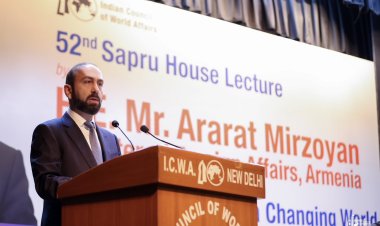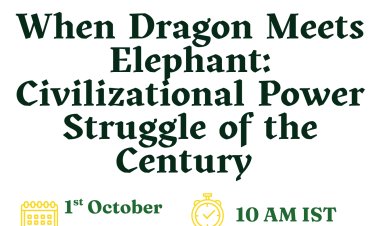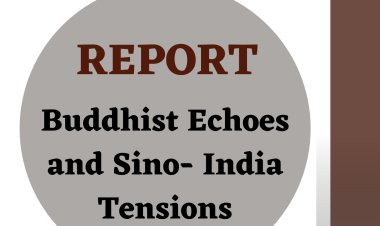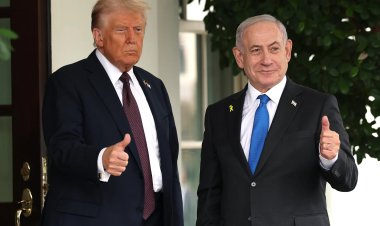Chinese Communist Party's Influence and Espionage Operations
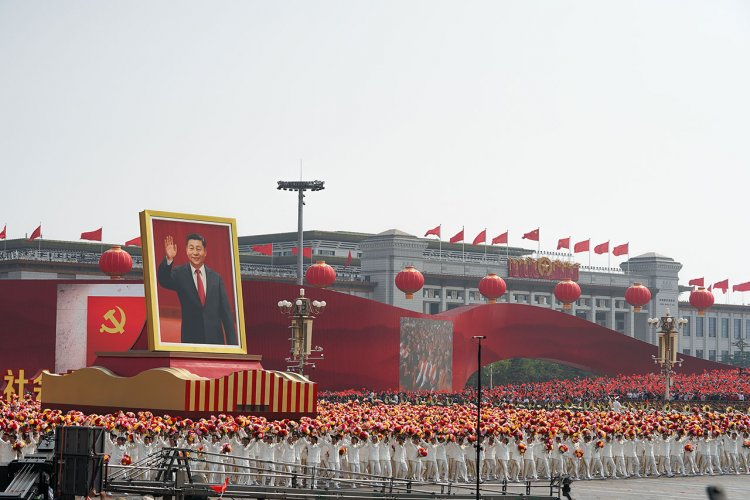
Webinar Report
By Usanas Foundation
On December 9, 2020, Usanas Foundation organized a webinar on “Chinese Communist Party’s (CCP) Influence and Espionage Operations”. The speakers for the webinar were Teng Biao a Grove Human Rights Scholar from the City University of New York and President of China Against the Death Penalty, Cleo Paskal an Associate Fellow at Chatham House, Non-resident Senior Fellow at the Foundation for Defence of Democracies, International board of advisors at the Kalinga Institute of Indo-Pacific Studies, Aadil Brar, a Freelance Journalist at the National Geographic Young Explorer, and Dipanjay Roy Chaudhury, diplomatic editor at the Economic Times Foreign and Strategic Affairs.
Teng Biao spoke about the Chinese Communist Party’s (CCP) threat to Global Freedom and Democracy. The first aspect is denial of free speech. CCP has various ways to deny free speech. One way is visa denial to professors, journalists, artists, politicians, etc. For example, the authors of the books ‘Xinjiang: China’s Muslim Borderland’ and ‘The Tiananmen Papers’ were denied visas to China.
The second aspect is meddling in elections. CCP has meddled in many elections. Countries like Taiwan, New Zealand, and Australia are the recent elections that the CCP has meddled with. How does China meddle in elections? CCP spreads massive amounts of disinformation. The Taiwan government had to start a defaming campaign in social media to eliminate disinformation. CCP economically blackmails countries like Taiwan. Whenever there is an election in Taiwan, Chinese government pressurizes Taiwan to favor the KMT party. Lastly, they use military threat to countries in the region to meddle with the elections.
The third aspect is influence operations. The objective is to make the world safe for CCP. CCP uses institutions like United Front Work, Confucius Institutes, CSSA, Chamber of Commerce, Townsmen Association, Alumni Association and Xinhua News Agency. These organizations are totally controlled by the Chinese embassy or the CCP. China has eliminated all the independent Chinese Language media outlets that once served the communities in the US, through a mix of co-option and aggressive expansion of its own competitors. The Chinese Students and Scholars Associations (CSSA) in the western universities get money from the Chinese embassy and receive instructions. For example, UCSD asked the Dalai Lama to give a speech on campus and not mention politics. However, CSSA protested outside and after the speech the Chinese government refused to send Chinese students and scholars to UCSD. The Confucius Institutes are supposed to focus on the Chinese language and culture but actually they are part of the propaganda and brainwashing for the CCP. The textbooks are filled with CCP narrative, CCP selects teachers, the curriculum and through this CCP eliminates any discussion on the sensitive topics.
This year Chinese National Congress passed the Hong Kong Security Law. Article 38 of the law puts everyone in the world at risk of being arrested if they ever come to Hong Kong and has supported independence of Hong Kong in the past. Using article 38, Hong Kong issued a warrant for Samuel Chu, an American citizen, activist and pastor’s son. The arrest warrant caught the attention of American officials concerned about Chinese imposition of authoritarian rule in Hong Kong.
Chinese secret agency kidnaps people in foreign soil. Li Zhisui, author of ‘The private Life of Chairman Mao: The memoirs of Mao’s private physician’ was kidnapped by CCP on foreign soil and was sent to mainland China to be detained and tortured. Wang Binzhang and Peng Ming were sentenced to life and died in custody 3 years ago. The kidnappings are not limited to Chinese passport holders and even UK or USA passport holders were kidnapped and sent to mainland China.
What can we do ? We should examine the china policy. Engagement policy was not working. Most scholars and policy makers hoped that China would become an open society and liberal democracy after engaging in an international system.
Cleo Paskal asked the question: what is the goal of this entire activity of CCP? The goal is to overtly advance the CCP comprehensive national power. CCP ranks countries based on relative comprehensive national power. The elements of those comprehensive national powers could vary but are very specific. It includes things like economic resources, human capital, natural resources, access to water, control over rare earths, capital resources, knowledge in technology resources, government resources, military resources, international resources etc. They use this to figure out a nation's comprehensive national power. The USA would say GDP and military power defines the national power whereas from Chinese perspective it is different. They include all these to define a country's power. Xi Jinping, President of China inaugurated Chinese National Security Commission in 2014. Xi spoke about what the Chinese National Security Commission would do. He said that the commission would be to integrate territorial security, military security, economic security, cultural security, technical security, informational security, ecological security, resource security and nuclear security. This is an incredibly comprehensive way of looking at what they are trying to build up. So the question is how do they do it? Looking at the Chinese sources, we find two frameworks.
First is unrestricted warfare. The bottom line is from the Chinese perspective you can use everything within your means, legal or illegal, to gather comprehensive national power. If China signs a UN convention about the South China sea and later if certain provisions are not in their interest, CCP ignores the convention and goes ahead with their plan. If you are negotiating with the PLA in Ladakh and India is following the rules, do not expect China to do the same because they said that their approach is unrestricted warfare. Within this unrestricted warfare there are three warfares. The first warfare is Public opinion and media warfare. If you are successfully countering the CCP narrative, CCP will try to discredit you and it will be blocked by the great firewall. Hollywood tries to not counter CCP narrative to avoid the blocking. You will never find a Chinese bad guy in Hollywood movies anymore. Anything that can shape public opinion. The second warfare is psychological warfare. For example continuously running huge military exercises off the coast of Taiwan and to scare an entire country to submission. The third warfare is legal warfare. The US tried to ban WeChat but suddenly out of nowhere, WeChat users group started fighting in the courts that the ban is against their freedom of speech. CCP will use the legal framework of the USA effectively and whereas they completely ignore it if it does not work in their favor.
Second way is intelligence. CCP gathers intelligence using two ways- Signal intelligence and human intelligence. Tiktok and WeChat are signal intelligence. I have an enormous amount of respect for what India did with blocking of Chinese applications when the Indian soldiers were killed in the border. It shows that India understands the comprehensive power and Chinese attempt to increase the comprehensive power using Tiktok and WeChat. They try to use these applications to control public opinion. For example in Tiktok, Trump ads or videos will not be shown to people and Joe Biden's videos will be shown. If you have a company in China because of the great fire wall you need to communicate using WeChat so that the CCP has access to all your information. Where you are preparing your resources, who you are selling it to, your intellectual property, and as the USA Director of National Intelligence said that eventually they could use it to steal or replicate your company and replace you in the market. These applications are useful tools to CCP to blackmail, compromise information etc. Huawei is the biggest example of data stealing.
Human intelligence component- Chinese female spy has had affairs with a couple of midwestern mayors that are close friends with democratic representative who is in the intelligence community and who was the biggest proponent of Russia. It was a long term approach that finds the soft spots of the system and embeds it. She enrolled in a US university and volunteered for the democratic campaigns and later became a fundraiser. CCP has the money, the focus and the people and a very specific goal which is to advance national comprehensive power. CCP tries to advance their national comprehensive power and limit other countries comprehensive power. Any vulnerability that a country might have in their system will be exploited by CCP. The book written by Kerry K. Gershaneck, an ex-marine soldier, titled ‘Political Warfare’ says that political warfare of CCP in Thailand and Taiwan has distorted the political system in those countries. He suggests US military, Politicians and Bureaucrats should be enrolled in a 5 day course to teach them how to identify Chinese political warfare because it is here, it is embedded and effecting all our political systems and we should be prepared for it. The book is free to download from the Marine University Press website.
https://www.usmcu.edu/Portals/218/Political%20Warfare_Web
This is something we will have to face and live with for a long time and she appreciated the Usanas Foundation for conducting this webinar on this topic.
Aadil Brar spoke about the state media and their role in the Chinese system. There is no corresponding word for ‘propaganda’ in Chinese. The closest word that we can find is ‘publicity’. State media outlets use journalism in the process of disseminating information. There is a specific hierarchy in the state media outlets. CCP always controls these media outlets. President Xi Jing has internationalized state media outlets to change the world view of China. China has more than 200,000 journalists and more than half of them work for the official broadcasters. These journalists play an important role in intelligence collection and elections. Most of their reports are not broadcasted. They are used for intelligence collection and analysis. Experts say that these reports and analysis are written in such a way that party politicians can read it and there is a difference between what has been collected and what has been released. In 2015, according to some estimates, CCP had an annual budget of 400m dollars for propaganda. We do not know the exact budget spent on propaganda but based on open source analysis and what we know, we can say that the budget has increased significantly since 2015.
Freedom Houses 2020 report says that Chinese media and propaganda has seen a significant shift since 2017. This includes Russian style social media disinformation campaigns, attempts to suppress any unfavourable news about China in foreign media, using social media platforms owned by Chinese companies to sponsor content outside China. We are now witnessing an increasing coordination of state media outlets and pro- CCP accounts in social media accounts. There is almost always a real time link of information between state media outlets and pro-CCP accounts in social media. This also means that China’s disinformation campaign is becoming more efficient but not as efficient as Russia's. Recently Twitter suspended almost 900 accounts that were deliberately set up to spread disinformation about Hong Kong and all over the world. In the disinformation realm, China will try to emulate Russian strategy. The Trump administration has taken extreme measures to block Chinese activities.
Dipanjay Roy Chaudhury addressed the issue from a journalistic view. The world has allowed China the space in the past to get to the place it is today. President Nixon reached out to the Communist party to split USSR and China and also to split communism. China used this space to gain power in today's geo-politics. Their aim is to control geo-politics. Chinese have a distinct way of doing this. They are copying various countries' methods to conduct espionage activities. They try to penetrate to Chinese diaspora in various countries and to control the dynamics of the regions. They tried to control the journalists in the regional countries by offering those journalists luxurious journeys or to offspring of the journalists. Although none of the espionage strategies are original to china and are copied from various countries, they have managed to master it.
CCP has tried their espionage tactics in India. The Confucius institutes to further CCP narrative was not successful in India. CCP also tried to penetrate into Indian think tanks however they have failed. The corporate or diplomatic attempts to penetrate to India have also failed. Even though Kolkata was ruled by a Marxist party for years, the penetration was very minimal and almost not there.
When the first Belt and Roads Summit was held in 2017, India was the first country to call the bluff of China while other countries were signing on the Belt and Roads Summit project. Even though there are various books written in the west about the Belt and Roads Summit, the arguments against the Belt and Roads Summit are weak. The awareness is still not up to level to see the bluff of the Chinese. Indian journalists are not afraid to write critical pieces against China. The Galwan incident has changed the Indo-China relations. If there was no killing of the Indian soldiers in the border, there would not have been this level of animosity and public opinion against China.
Question Session
Q.1 How is 5G technology like Huawei involved in espionage and could you explain why was it banned in the USA and in other countries? Was it because of its presumed involvement in Espionage?
Cleo Paskal answered this question. Not just espionage but also because of manipulation. China thinks that the world is heading towards an online and AI world. That is the realm that they very overtly watch and control. Huawei is a brand but it produces multiple sorts of technology. Huawei takes a lot of personal data but there is also manipulation of data which is an entirely different problem. We have seen the manipulation of data by Huawei recently in the South Korean election in April 2015. The report was written by a former marine colonel and was published in The Daily Guardian. The report says that the counting machine had Huawei components in them. The results of the elections were very much in the favour of Moon's party and it gave him enough majority within congress to change the constitution. The numbers were extremely peculiar. The investigation shows that it looks like something suspicious happened. The entry point looks like Huawei technology that was created in the subsystem. It is a good idea not to get caught up in specific brand names. We know Huawei is a problem and China knows that we know Huawei is a problem. So consistent with how CCP works through espionage, deception and manipulation, CCP will try to push brands that we think are ‘clean technology’, ‘clean brands’. There is a global push for clean technology. It’s been proposed to have a detan of technology which would be the G7 countries plus India and South Korea. If China has an increasing influence within South Korea and linkages with Samsung now we have to look into Samsung. It’s not just Huawei. Huawei has become so overt as a problem that CCP will try to get into UK technology companies, French technology companies i.e. the companies that we think are clean companies.
China continuously tests the threshold of countries. What happened in Galwan was to determine Indian threshold and CCP, thought that Indian threshold was way higher. The Indian response surprised them, and CCP backed out. So that is what they do. They push, push and then back off after seeing the threshold. Then they will push from some other side. What is happening in the context of the USA is that CCP will try to test and determine the threshold of Joe Biden. Political warfare is not something new to the world and is not unique to China. What is unique to China is using political warfare as a tool to achieve the goal of advancing comprehensive national power.
She shared videos and article links to read further.
- Di Dongsheng speech on why can’t buy Trump, and how Biden son’s fund related to China
https://www.youtube.com/watch?v=aeegrkPx0xE
- CLAWS article on Comprehensive National Power
https://archieve.claws.in/images/journals_docs/1302263399_JS
- Sec. State Pompeo on how US helped create modern China:
https://www.youtube.com/watch?v=7azj-t0gtPM
Q.2. In terms of CCP funding dissidents and terrorists in the North-Eastern India or even buying Indian intellectuals to speak up against the Indian state. How can they be isolated and called out internationally?
Dipanjay Roy Chaudhury answered this question. When we are talking about China funding insurgency in the Indian region and in its neighbouring countries we also need to factor in Pakistan. Pakistan is the second biggest country in South-East Asia after India. Even though Pakistan is not successful in revival of its influence in the region however their entire ‘goodwill’ attempts to increase Pakistan influence in the region has been funded by China. Pakistani attempts to reignite the insurgencies in the North Eastern region. China has stopped funding the insurgencies in the North-Eastern region after the 1980s. Most of them entered talks with the Indian state, or stopped, or fled to Bangladesh. The insurgency support in the region will not be as active as the 60s and 70s but there will be support together with Pakistan in the region to reignite the insurgency activities. The world today is very different from what it was in the past and countries in the region understand that they need to cooperate with each other. They try to cooperate with India.
In terms of intellectuals, CCP has tried to indirectly influence certain intellectuals in India. However, language is a big problem in China. Some Indian intellectuals did and still go to seminars and universities to give lectures and some of these lectures are very critical of China but all this is done under the control of Xi Jinping regime.
The influence of China on Indian media is different. Indian media is not controlled or run by the government. There have been advertisements by certain newspapers in India supporting China during Covid-19 outbreak but these newspapers are not the major ones. Newspapers make their own choices. The advertising team does not talk to the editorial team. How can you tell an Indian TV or a newspaper not to take an advertisement from anybody?
Disclaimer: The opinions expressed in the webinar belong to the panellists and not necessarily to the Usanas Foundation.


